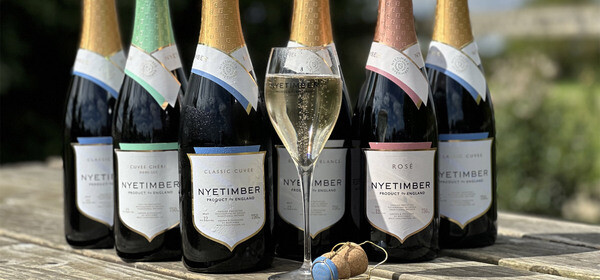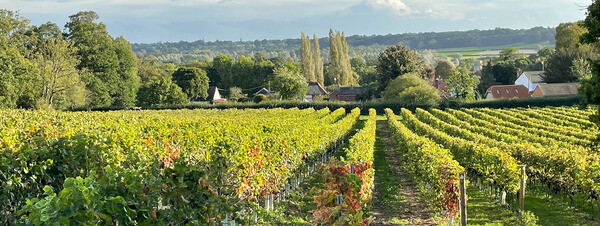The British Wine Industry is Effervescent
The British Wine Industry is Effervescent
The future of UK wine continues to look rosé. Effervescent, more like. Because growth in British wine – more specifically via English sparkling wine producers (unequivocally its driving force) – continues to rise upwards.

UK Wine Government Deregulation
It’s a continuing trend only encouraged by the government’s scrapping of certain outdated, EU-inherited regulations in 2024. Indeed, such reforms as have been made possible via Brexit will include innovations in packaging, in sustainable practices, and a reduction of burdens on businesses.
One example being that producers will no longer have to use traditional, mushroom-shaped Champagne stoppers and foil covers on bottlenecks but instead will have the choice to opt for simpler packaging and greater potential for reducing both waste and costs.

Another is removing the requirement for imported wines to have an importer address on the label, thus reducing administrative burdens for businesses.
Restrictions will also be scrapped on the making and selling of piquette – a low-alcohol, rustic-style beverage made by rehydrating the leftover grape pomace – skins, seeds, and stems – after winemaking. Traditionally enjoyed by vineyard workers, it undergoes a brief fermentation, resulting in a light, fizzy, and refreshingly tart drink, typically between 4-9% ABV.
This derestriction relates to said innovations in sustainable practices given that piquette is considered an eco-friendly, natural alternative to conventional wines, offering a vibrant, thirst-quenching option with minimal waste and a unique, fruit-forward character. Moreover, it gives producers the option to create new income streams and tap into consumer demand for such lower-alcohol drinks.
It’s All Grow
All of which is good news for a wine market worth over £10 billion last year – particularly when seeing at what speed England and Wales’ winemaking industry continues to grow.
Which is to say grow by way of almost 900 vineyards across a number of hectares which itself has quadrupled in since 2000. Such that WineGB.co.uk forecasts that area to reach up to 7,600 hectares by 2032 (based on a yearly planting average of 325 from 2025), potentially to the tune of between 25 and 29 million bottles of sparkling wine produced.
All this accounts for the remarkable fact that viticulture – the cultivation and harvesting of grapes – is now Britain’s fastest-growing agricultural sector, employing almost 2.5 thousand people full time with a predicted 50% growth in jobs by 2025.

Sticking with the ‘growth’ motif, what’s more is that the 2023 vintage has been the nation’s largest-ever harvest, with an estimated production yield of 20-22m bottles – an increase of over 50% on Britain’s previous record in 2018.
Continuing Investment
No wonder the English Sparkling Wine sector continues to attract investment both domestically and from abroad. As much as £480 million between 2017 and 2022, including ventures driven by high-net-worth individual investors.
Reasons to feel bubbly. Indeed, now with fewer restrictions on production, increased incentives for innovation, a biggest-ever vintage yield, and a continuing expansion of sales, confidence and hectares under vine, UK wine producers have never had more reasons to be popping corks.
If in the meantime you’re interested in popping some corks yourself, come explore Mr.Wheeler’s range of English sparkling and still wines.
-- David Adamick, Mr.Wheeler Wine
